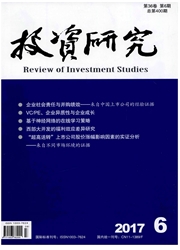

 中文摘要:
中文摘要:
增发新股是中国上市公司股权再融资的主要方式。考虑到股权再融资的重要性,有必要对中国上市公司选择股权再融资的动机进行分析。本文以1998-2013年沪深A股上市公司增发样本作为研究对象,检验影响上市公司选择股权再融资方式的因素。通过Logistic模型我们发现,与成熟市场的研究结论类似,在中国,上市公司增发新股(公开增发与定向增发)主要是为了利用市场高估状态的"机会之窗"行为,市场择时理论在不同样本间均得到一致支持;投资与成长理论得到部分支持;由于公开增发和定向增发不同的发行机制,上市公司大股东更倾向于利用定向增发方式侵蚀中小股东的利益,代理理论在定向增发样本中得到支持,而在公开增发中没有获得统计支持;权衡理论没有获得统计支持。
 英文摘要:
英文摘要:
Issuing new shares is the main way for Chinese listed companies' equity refinancing. Considering the importance of seasoned equity offerings, it is necessary to analyze the motivation of Chinese listed companies choosing equity refinancing, with the sample of 1998-2013 the Shanghai and Shenzhen A-share listed companies issuing, this paper investigate the influence factors that why listed companies choosing equity refinance. With the logistic model, this paper find that Chinese listed companies issuing new shares is mainly to make use of market overestimate status, and the evidence from different samples suppose the theory of timing market, which is consistent with the results from mature markets;Investment and growth theory receive partly support; and due to the different issuing mechanism between public offerings and private offerings, major shareholders of listed companies tend to use the private offering to tunneling, the agent theory receive support within the private offering subsamples, while do not receive support within the public offerings subsamples, and the tradeoff theory do not receive any support in each of the samples.
 同期刊论文项目
同期刊论文项目
 同项目期刊论文
同项目期刊论文
 期刊信息
期刊信息
